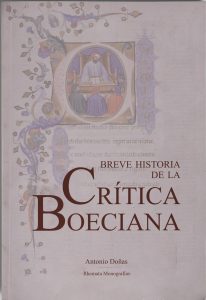A Brief History of Boethian Scholarship
This volume provides a concise overview of critical reflections on the life and work of the Roman mathematician, philosopher, theologian, and poet Anicius Manlius Severinus Boethius (c. 480-c. 525) from shortly after his death to the present day. The first part of the book addresses some episodes of pre-modern criticism, especially during the Middle Ages and the Renaissance, while the second part examines in more detail the primary critical trends in Boethian scholarship from the mid-19th century onwards. Particular interest is paid to the evolution of various modern conceptions regarding the role of the author of The Consolation of Philosophy in the history of culture: from the Janus-faced Boethius, looking simultaneously towards Classical Antiquity and the Middle Ages, in early 20th-century Geistesgeschichte, through the view of Boethius as a conduit or transmitter of Greco-Roman thought in the mid-century, to the prevailing portrayal in current criticism of an original thinker with a unified cultural project.
Within this process, there has been a shift from the passionate controversy surrounding the reconciliation of the various dimensions of Boethius, primarily that of the pagan philosopher of the Consolatio and that of the Christian theologian of the Opuscula sacra, to the segmentation of Boethius into roles such as politician, philosopher, theologian, poet, mathematician, and musician, only to, finally, after more than a hundred years of scholarship, return to the old task of achieving a comprehensive understanding of the life and work of the Roman writer. Having received critical attention relatively late compared to other major authors of Antiquity, there has been a gradual reevaluation of Boethius’s figure, especially since the centenary celebrations of his birth in 1980, which positioned him as one of the most studied authors of Greco-Roman Antiquity at the beginning of the 21st century. This reappraisal is further enhanced by his uncommon popularity among non-specialised audiences, primarily due to his notable presence in John Kennedy Toole’s work, A Confederacy of Dunces.

Antonio Doñas, Breve historia de la crítica boeciana, Reus: Rhemata, 2024.












